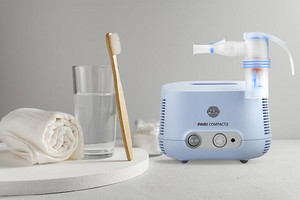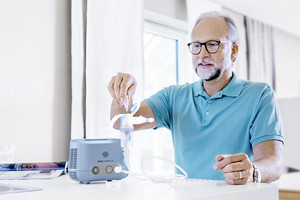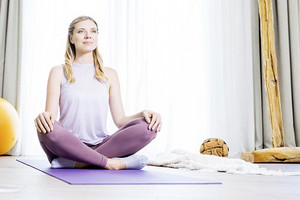Wednesday, 13. November 2024
Regardless of why you are doing inhalation therapy with a nebuliser – a chronic disease or a stubborn acute respiratory infection or the desire to keep germs at bay – it is not always easy to stay motivated to do daily treatments. These 5 tips will help you incorporate inhalation therapy into your daily routine and stay motivated to stick with it.
Who needs to do daily inhalation therapy? And why? There are many reasons why people do daily inhalation therapy. The three most common examples are:
Some severe chronic lung diseases such as bronchiectasis, chronic bronchitis, COPD, cystic fibrosis and PCD require regular inhalation therapy. Chronic respiratory diseases can affect both children and adults. It is especially important for these individuals to make inhalation therapy a regular part of their daily routines. Because not only does regular inhalation therapy relieve symptoms, it also can delay progression of the disease.
Acute bronchitis, pneumonia, coronavirus infection, the flu, bad colds... Often when acute respiratory tract infections compromise the lungs, doctors often prescribe inhalation therapy with a nebuliser. It relieves symptoms, improving patients’ wellbeing and helping them recover from the infection more quickly. Depending on how bad the illness is, the inhalation therapy may be needed for a few days to several weeks or months.
But there are also people who are completely healthy who still use inhalation daily, such as athletes or anyone who wants to maintain their airways. High-performance athletes who compete in winter sports in particular use inhalation therapy in the colder months to keep their mucous membranes moist and to take care of them to get through the season in good shape. Because well maintained mucous membranes have a leg up when attacked by viruses and other pathogens. This is why physiotherapist Brigitte Schmailzl encourages the German national bobsled team to do inhalation therapy, for example.
Inhalation of saline solutions with a nebuliser can also be used as a preventative measure against hoarseness or to ease hoarseness. This is particularly important for people who use their voice frequently for professional reasons. Singer and singing teacher Leon Singer recommends that his students use nebulisers when ill – or if they simply want to do something good for their voice. After all, musicians need to look after their instrument.
Good voice care is also important for authors. They are often on the road for readings. A healthy voice is therefore very important for writers. Alexandra Wagner is a children’s book author. Her home remedy for hoarseness is inhalation therapy.
Inhalation therapy plays an important role in the treatment of people with a tracheostomy. After a new tracheostomy has been placed, secretion management is an essential part of the treatment in addition to speech therapy support. Inhalation with a nebuliser is a standard procedure in therapy.
It also helps if the tracheostomy is heavily clogged with mucus. It helps to liquefy the secretions in the airways, making it easier to cough up or aspirate the mucus from the tracheostomy tube. A clean tracheostomy tube improves breathing and prevents infections.
With inhalation therapy – just like when resolving to exercising daily – the key is to turn it into a routine that is not problematic.
Here are our 5 tips to help you do your inhalation therapy every day:

Try to think of the inhalation therapy as a daily ritual. Like you always brush your teeth in the morning and evening, set aside a certain time of day for the inhalation therapy. Here are some times you could try:

Do you want the shortest possible inhalation time that still has the desired effect? Then use a modern nebuliser that nebulises inhalation solutions and medications effectively and rapidly. The PARI BOY is a modern inhalation device. PARI devices are the leaders among devices that offer short nebulisation times while delivering high lung doses of the desired medication.

Change your perspective and look at the inhalation therapy not as a burdensome obligation, but as time for yourself. Inhalation therapy can be combined really well with a sort of breathing meditation where you close your eyes, take deep breaths in and out and you concentrate only on your breathing. Meditation not your thing? Then combine the inhalation session with a calm activity you enjoy and that you can do to pass the time while sitting down. Watch a suspenseful film. Listen to an audiobook or discover a new favourite daily podcast while you do your lungs a favour.

Admittedly there are more exciting things than inhalation therapy. But inhalation is good for your airways. For people with chronic respiratory diseases it is even essential. But try focusing less on the fact that you have to do it, and more on the benefits you get from inhalation therapy: You will cough less and breathe more freely afterward because you can clear viscous mucus from your lungs more easily and better. As a result you will be able to handle more and do more throughout your day. Your airways will be better equipped to fight viruses and bacteria and more resistant. Realise that when you do your inhalation therapy you are doing something good for yourself.
Especially when doing inhalation therapy for prevention and the positive effect of the inhalation therapy is not really felt immediately and directly, it is hard to stick with it. Trick yourself by rewarding yourself after every inhalation session. For example, put a check mark on your to do list or in your calendar. Or give yourself to a little treat, a nice cup of tea or whatever you like after the inhalation session.
Are you often at your wit’s end because your child needs to do inhalation therapy daily but resists it? Do you have to deal with daily battles about respiratory therapy? Welcome to the club! You are not alone.
Here are some blog posts and links with tips on inhalation therapy for children and parents sharing their experiences.
An article written by the PARI BLOG editorial team.
© 2025 PARI GmbH Spezialisten für effektive Inhalation